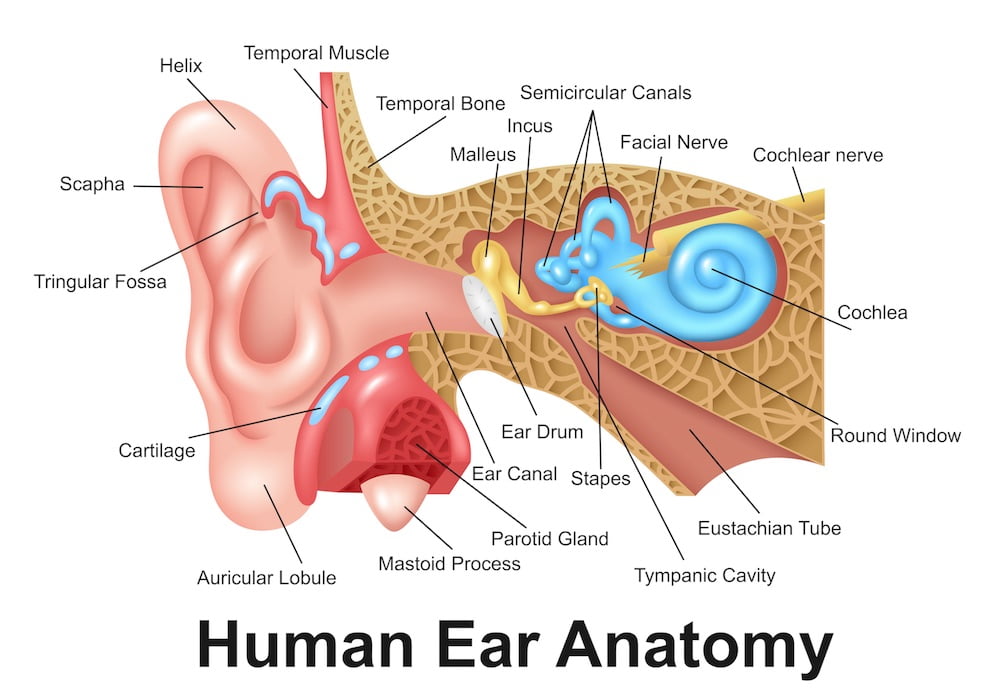

Hearing loss is a common issue that can greatly impact our quality of life. Reduced hearing capacity can cause us to struggle to hear and understand everyday sounds around us and distort our listening ability especially when it comes to normal conversational speech around us. Hearing loss can affect one or both ears. Factors such as age, exposure to loud noises, genetic factors, infections and certain medical conditions can contribute to hearing loss.
Age Related Hearing Loss
As some people age, hearing ability can begin to decline. Age-related hearing loss (presbycusis) tends to be a gradual process as a person gets older. It can occur as a result of changes in the inner ear and auditory nerve, which is what sends signals from the ear to the brain.
Exposure to Loud Noises
Exposure to loud noises for over an extended period can damage the tiny hair cells in the ear, causing these cells to die. The longer the exposure carries on, the more damage can occur. Unfortunately this type of damage to the inner ear is irreversible (permanent).
Ear Infections
An ear infection is an infection that affects the middle ear and is more common amongst children than adults.The infection causes the thin tubes that extend from the middle ear to the back of the throat to swell or get blocked resulting in mucus build-up. In many instances, ear infections will heal on their own. If not, a course of antibiotics may be required to rid the infection.
Genetic Hearing Loss
Hearing loss can also be passed on genetically from parent to child. In fact, this type of hearing loss accounts for 50% of all hearing impairments in chlidren.
How Our Hearing Works
Let’s take a look at how our hearing actually works. The process begins with sound waves entering our ear and traveling through the ear canal. These waves then cause the eardrum to vibrate. These vibrations are then transmitted to the ear via the cochlea which is a spiral shaped structure filled with fluid. Within the cochlea tiny hair cells convert these vibrations into signals that are sent to the brain via the nerve. The brain in turn interprets these signals as sound. Any kind of interference or harm to these tiny hair cells, cochlea or auditory nerve can lead to a reduction in our hearing ability. For people dealing with severe hearing impairments, assistance therapy can help improve communication skills. Such therapy includes ways to boost speech and foster listening skills and improve overall communication capabilities.

The Importance of Early Detection of Hearing Loss
If your hearing ability is showing signs of having lessened, getting help at the earliest stage possible is an important step for you to take. An audiologist can determine the extent of your hearing loss and suggest the best treatment options. An initial hearing test is the first step in the process as it can provide valuable insights into the nature and severity of your hearing impairment. Your audiologist can tailor a treatment plan to meet your individual needs.
Types of Hearing Impairments
Let’s have a look at the three main categories of hearing loss there are:
Conductive hearing loss
Conductive hearing loss usually happens when sound waves can’t pass through the outer or middle ear. This form of hearing loss is temporary in most cases. It can happen as a result of ear infections, fluid buildup, earwax blockage, or perhaps some abnormalities in the ear canal or middle ear bones. Symptoms may include muffled or reduced sound perception, ear pain or a feeling of fullness in the ear. Treatment options for conductive hearing loss may include medication, earwax removal, surgery to correct structural abnormalities, or the use of hearing aids
Sensorineural hearing loss
This type of hearing loss stems from inner ear or auditory nerve damage. Factors such as aging, exposure to loud noises (e.g. workplace noise, concerts or loud headphone usage) certain health conditions can contribute to this type of impairment. Sensorineural hearing loss is typically permanent and will usually require the use of hearing aids or other assistive devices to manage it. Common culprits behind this type of hearing loss include aging (referred to as presbycusis) exposure to excessively loud noises, genetic predispositions, a blow to the head and other specific medical conditions.
Mixed hearing loss
In some cases, conductive hearing loss combines with sensorineural hearing loss. In cases such as these it’s possible that there is damage in both the outer or middle ear as well as the inner ear or auditory nerve . This is what is known as mixed hearing loss.
Overall, the treatment for hearing loss will very much depend on what caused the hearing loss in the first instance. For hearing loss caused by excessive earwax buildup, a simple ear wax removal treatment will usually restore normal hearing. However in situations where the hearing loss is permanent the fitting of hearing aids or other assistive devices may be needed to help amplify sound and enhance hearing ability. In some cases treatment may involve a combination of both medical interventions in addition to the use of custom hearing aids.
When Should You Seek Professional Assistance?

Indications of Hearing Loss
Struggling to follow conversations
Being able to hear, understand and participate in conversations is an important aspect of your life. Not being able to hear what others are saying around you can prove to be very frustrating which, in turn, can also lead to feelings of anxiety and even a sense of isolation.
Frequently asking others to repeat themselves
When people speak to you in person or on the phone, you may be finding that you are not catching every word they are saying to you.
Increasing the volume on devices, like TVs or radios
A telltale sign that you are experiencing a degree of hearing loss is having to turn up the volume on the television or radio in order to hear what is being said.
Difficulty hearing high pitched sounds
This type of hearing loss is often referred to as high-frequency hearing loss. If you suffer from this type of hearing loss, you may find yourself having difficulty hearing consonants which, in turn, can cause you to believe that others you are speaking with are mumbling a bit.
Not hearing everyday sounds like the doorbell, phone etc.
Impaired hearing can cause you not to hear normal everyday sounds like the doorbell ringing, alarms, kettle boiling and many other household sounds. This type of hearing inability can not only be very inconvenient but also quite dangerous. especially in the case of hearing warning sounds such as alarms.
Experiencing tinnitus (ringing in the ears)
Tinnitus is the perception of hearing sounds in your ear like ringing or hissing. It can affect one or both ears. Tinnitus can be triggered by many different factors. It can be the result of exposure to loud sounds, playing or listening to music at too high a level, age related hearing loss, certain medications, earwax build-up or possibly even a head or neck injury.
Balance problems
Reduced hearing can cause sensations of unsteadiness or imbalance. This can be an indication of hearing problems
Trouble hearing in surroundings
If you have trouble hearing others when there are background noises , it could be a sign that you are hearing loss. This can be a very gradual experience that can happen over time.
Untreated hearing loss can lead to so many other issues in an individual’s normal daily routine. These issues can include:
How Hearing Loss Can Affect Your Wellbeing and Relationionships
Neglecting hearing loss can profoundly impact an individuals well being affecting relationships, mental health and physical wellness.
Personal relationships
Hearing loss can strain connections and hinder the flow of communication with loved ones. Engaging in discussions in noisy settings can become challenging and can cause social withdrawal.
Personal health
Untreated hearing loss can have consequences for your health. It may lead to reduced levels of activity, an increased likelihood of falls and a possible decline in your overall health.
What options are available to tackle your hearing loss?
If you suffer from hearing loss, the good news is that there are so many advances in technology that have provided some very effective solutions. The first step to take is to get in touch with us here at HearMed to schedule an appointment for a free hearing test. We can carry out a full evaluation of your current hearing levels and recommend the best treatment path to improve your hearing capacity.



